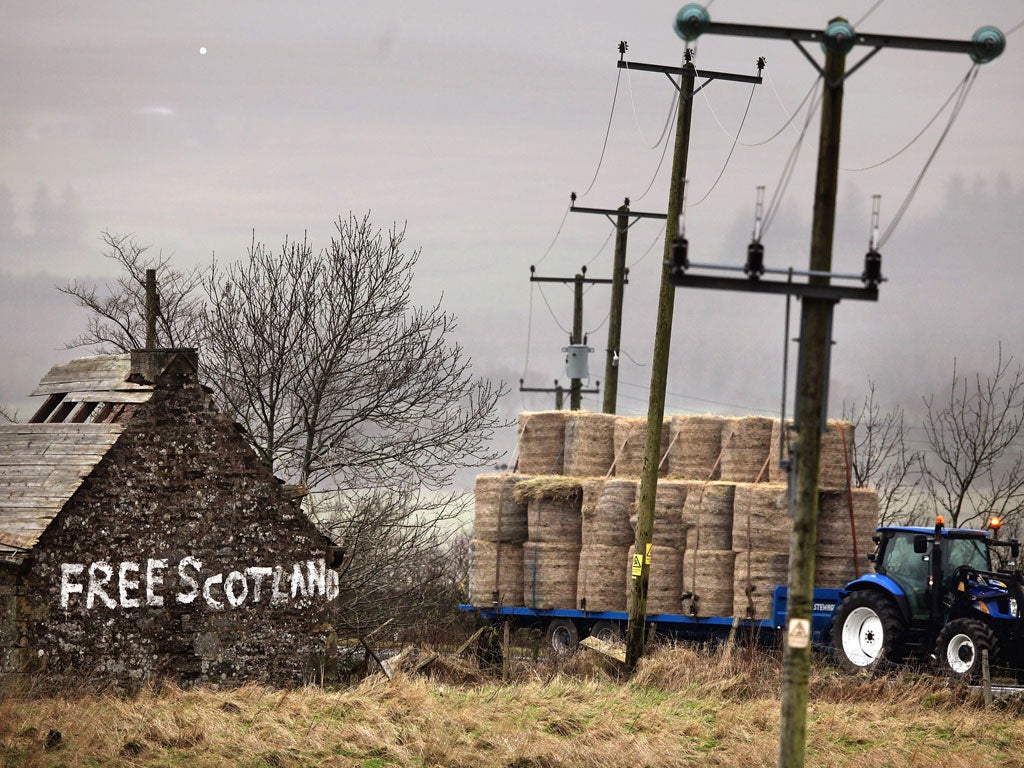Economics will decide the referendum - so is an independent Scotland a richer Scotland?
Potential oil revenue and lost subsidy from English taxpayers will likely cancel each other out. Let's concentrate on the uncertain aspects of Scotland's economic future


So Scotland gets its referendum on independence. The general perception is that the debate will now switch to the economics of it all. It is a perception given a certain spice by an opinion poll suggesting that if Scots felt they would be £500 a year a head better off they would vote in favour, and if the same amount worse off they would vote against.
The economics are liable to be twisted depending on people’s political aims but there are some clear facts as well as many imponderables. As it happens, I was at a seminar in Edinburgh last week organised by the David Hume Institute, which helped clarify what is known, what can be guessed at, and what is unknowable.
Up to now, most of the debate has focused, on the one hand, on the scale of the subsidy that the English taxpayer gives to Scotland and, on the other, the bonus that Scottish oil revenues give to the rest of the UK. Yet that is one of the simplest aspects of the calculation because the two flows roughly cancel out. Scotland has higher state spending per capita than England and Wales, notwithstanding the fact that its GDP per head is the same as the UK’s as a whole. But, under international law, it would get some 90 per cent of the oil revenues, which would be enough to sustain that higher spending.
There are obvious uncertainties here, including the oil price and production. In view of these, Scotland would be wise to set aside some oil revenues in good years and build up a national wealth fund, as Norway has done. The oil will eventually run out. But there are uncertainties even now, such as the political sustainability of annual transfers from south of the border as austerity bites.
There is also an uncertainty over the apportioning of the National Debt. Should it be divided on a per capita basis, or proportionate to GDP? There’s no international law to guide here, so it would be a negotiation. But with good will on both sides, you can see a fiscal deal that could be cut.
The monetary and institutional issues are less clear. Initially at least, Scotland would retain the pound. Ireland linked its currency to sterling for nearly 60 years after it became independent. There would be the theoretical disadvantage of having no say in setting interest rates but that would not change things, for there is no Scottish representative on the Bank of England’s monetary policy committee now. But there are other practical problems. I am not sure how quantitative easing would be carried out, nor who would be lender of last resort to the Scottish banks. Could Scotland support a bank of the size of RBS and, if not, how would it and the Bank of Scotland side of Lloyds be apportioned for regulation? Beyond that, there is the European dimension, though I find it hard to see the EU blocking Scottish membership, particularly if England is to disengage further.
But beyond all these practical questions, there is the biggest question of all: would the dynamics of the Scottish economy shift if the country were to be independent?
Some argued at the seminar that there would be a burst of “ animal spirits” (Keynes’s phrase) that would boost economic performance. Others wondered about the impact on human capital: would more talented workers want to come to an independent Scotland or might some non-Scots feel less comfortable and leave? My own view, as a part-Scot, brought up in Ireland and living mostly in London, is that this is the most important issue of all. It is also the hardest one to gauge – but that is economics for you.
Has Krugman got the answer?
High jinks in Parliament, from economists rather than politicians, in a debate on the economics of deficit reduction. Paul Krugman, of Princeton, and Jonathan Portes, of the National Institute of Ecomics and Social Research, argued that countries should not be cutting their deficits as fast as, for example, the UK, while Stephen King, of HSBC, and Bridget Rosewell, of Volterra Partners, countered that deficit reduction was a necessary correction to the debt overhang. It is important because the Opposition follows Krugman/Portes, while the Coalition cleaves to King/Rosewell.
Some observations. First, governments everywhere are cutting deficits – though we don’t know the speed at which the US will until after the election. So whatever the intellectual arguments, in practice the consolidators are winning in terms of practical policy. Second, most arguments that deficit reduction should be slower come from the US which can borrow more than other countries can because of the reserve role of the dollar and breadth of the US bond market.
A third point relevant to the UK is the fact that we can finance our deficit so cheaply – evidence for Krugman that we can and should borrow more – maybe precisely because we have a credible plan to cut the deficit.
Join our commenting forum
Join thought-provoking conversations, follow other Independent readers and see their replies
Comments